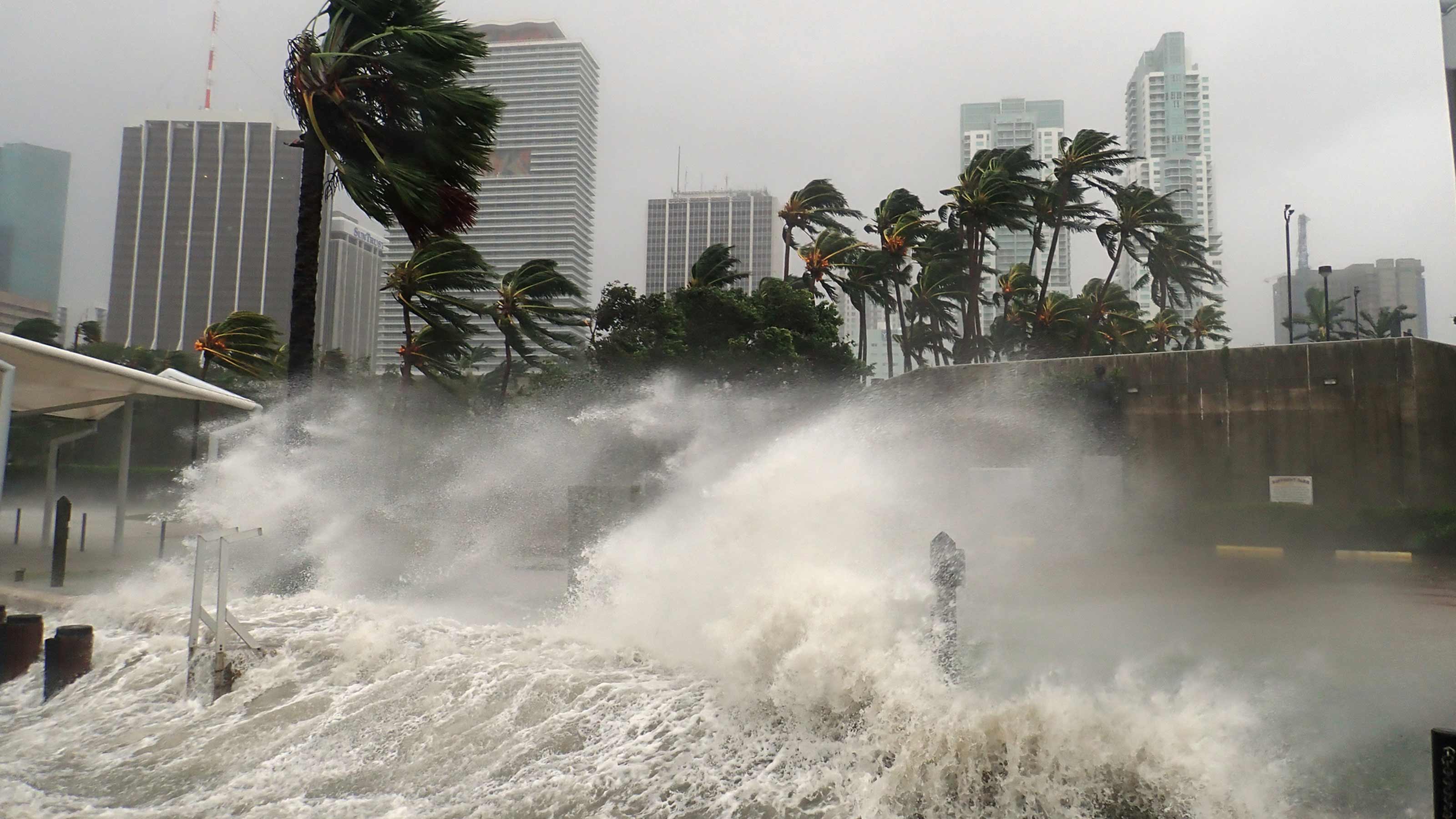Hurricane Season: Home, Family and Financial Planning Tips
Hurricane season officially began on June 1, and it runs through Nov. 30. So get ready now, in the calm before the storms.


Profit and prosper with the best of Kiplinger's advice on investing, taxes, retirement, personal finance and much more. Delivered daily. Enter your email in the box and click Sign Me Up.
You are now subscribed
Your newsletter sign-up was successful
Want to add more newsletters?

Delivered daily
Kiplinger Today
Profit and prosper with the best of Kiplinger's advice on investing, taxes, retirement, personal finance and much more delivered daily. Smart money moves start here.

Sent five days a week
Kiplinger A Step Ahead
Get practical help to make better financial decisions in your everyday life, from spending to savings on top deals.

Delivered daily
Kiplinger Closing Bell
Get today's biggest financial and investing headlines delivered to your inbox every day the U.S. stock market is open.

Sent twice a week
Kiplinger Adviser Intel
Financial pros across the country share best practices and fresh tactics to preserve and grow your wealth.

Delivered weekly
Kiplinger Tax Tips
Trim your federal and state tax bills with practical tax-planning and tax-cutting strategies.

Sent twice a week
Kiplinger Retirement Tips
Your twice-a-week guide to planning and enjoying a financially secure and richly rewarding retirement

Sent bimonthly.
Kiplinger Adviser Angle
Insights for advisers, wealth managers and other financial professionals.

Sent twice a week
Kiplinger Investing Weekly
Your twice-a-week roundup of promising stocks, funds, companies and industries you should consider, ones you should avoid, and why.

Sent weekly for six weeks
Kiplinger Invest for Retirement
Your step-by-step six-part series on how to invest for retirement, from devising a successful strategy to exactly which investments to choose.
Believe it or not, hurricane season is here. Preparing early while you have the time can save you the stress of having to panic when a storm is right around the corner. The need for preparation couldn’t be clearer in the wake of the gasoline panic buying we’ve just witnessed after the recent pipeline hack, and who could forget the run on toilet paper at the beginning of the COVID-19 outbreak?
Below are some planning ideas you can put in place in advance of a storm. Basically, you’ll want to be ready in case you have no power or water for a week or longer.
Home and Family Planning
- Store enough non-perishable food and water for at least three to seven days for your family. You may want to fill up the bathtub or other large containers with extra water for washing dishes and flushing toilets.
- Have cash handy. If the power is out, ATMs will not work (nor will credit cards) and you may need cash for essentials.
- Having a battery-powered or solar-powered radio can be helpful, so you can keep abreast of what is going on outside.
- Declutter. Secure outside furniture or any items that can become projectiles. In addition, cut down trees that could damage your home or your neighbors’ property.
- If you don’t have hurricane impact windows, make sure your shutters are functional.
- Charge electronics, buy back-up devices and have flashlights and replacement batteries on hand.
- Have enough food and supplies for children and pets – don’t forget the entertainment, including games and toys!
- Fill any important prescription medications so you have ample supply in the event you cannot get to the pharmacy or doctor.
- Buying or preparing a first aid kit or emergency bag may be helpful – you can find these bags on Amazon for under $100. You can create a larger kit for staying at home and a smaller kit in the event you have to evacuate.
- Plan for family members with disabilities and chronic illnesses. Many medical devices need power supplies.
- Fill up all your cars and make sure you have enough fuel for generators.
- Talk to family members to decide how you will contact each other and what your plan will be in an emergency. Write down important phone numbers and store them with your important documents — most of us don’t remember phone numbers in our heads anymore, and if you lose power and your cellphone battery dies you won’t have access to your contacts anymore. Make a list of emergency phone numbers and family physicians. Some ideas can be found here: http://www.ek-ff.com/Organizer.pdf
- Secure boats and RVs. If you have a swimming pool, check the fence around it and the safety net or pool cover. Consider a pool alarm in the event the fence blows down, as swimming pools can pose a danger to children and pets, especially after a storm.
Financial
- Review your homeowners and flood insurance to make sure you have adequate coverage now, well before any storms even form. Real estate values have gone up considerably in some areas, so make sure your policy has kept up with home values and replacement costs.
- Store important documents on secure cloud storage services so you can access them remotely later. You may want to store your insurance policies and any other important home-related documents. At Evensky & Katz we provide all our clients with their own client portal document vaults where they can securely store important documents.
- Buy a waterproof case for personal documents, such as marriage certificates, birth certificates and passports – something that can be grabbed quickly if you have to evacuate. As backup you may want to scan these documents and save copies in a password-protected file.
- Secure valuables, such as jewelry and sentimental memorabilia (old photos and heirlooms). Possibly store them in a safe deposit box or fireproof/waterproof safe.
- Most insurance policies have a 2% hurricane deductible, so make sure you have enough cash set aside in the event you need to come up with these funds for urgent repairs. Insurance companies may take awhile to send adjusters and process claims.
- If you own a business, make sure you have a continuity plan in place.
Since we are still in a pandemic this website may be useful:
From just $107.88 $24.99 for Kiplinger Personal Finance
Become a smarter, better informed investor. Subscribe from just $107.88 $24.99, plus get up to 4 Special Issues

Sign up for Kiplinger’s Free Newsletters
Profit and prosper with the best of expert advice on investing, taxes, retirement, personal finance and more - straight to your e-mail.
Profit and prosper with the best of expert advice - straight to your e-mail.
Other useful websites:
- https://www.miamidade.gov/global/emergency/hurricane/home.page
- https://www.ready.gov/hurricanes
- http://www.floridadisaster.org/
Profit and prosper with the best of Kiplinger's advice on investing, taxes, retirement, personal finance and much more. Delivered daily. Enter your email in the box and click Sign Me Up.

Roxanne Alexander is a senior financial adviser with Evensky & Katz/Foldes Financial handling client analysis on investments, insurance, annuities, college planning and developing investment policies. Prior to this, she was a senior vice president at Evensky & Katz working with both individual and institutional clients. She has a bachelor’s in accounting and business management from the University of the West Indies, she received an MBA at the University of Miami in finance and investments.
-
 Dow Adds 1,206 Points to Top 50,000: Stock Market Today
Dow Adds 1,206 Points to Top 50,000: Stock Market TodayThe S&P 500 and Nasdaq also had strong finishes to a volatile week, with beaten-down tech stocks outperforming.
-
 Ask the Tax Editor: Federal Income Tax Deductions
Ask the Tax Editor: Federal Income Tax DeductionsAsk the Editor In this week's Ask the Editor Q&A, Joy Taylor answers questions on federal income tax deductions
-
 States With No-Fault Car Insurance Laws (and How No-Fault Car Insurance Works)
States With No-Fault Car Insurance Laws (and How No-Fault Car Insurance Works)A breakdown of the confusing rules around no-fault car insurance in every state where it exists.
-
 For the 2% Club, the Guardrails Approach and the 4% Rule Do Not Work: Here's What Works Instead
For the 2% Club, the Guardrails Approach and the 4% Rule Do Not Work: Here's What Works InsteadFor retirees with a pension, traditional withdrawal rules could be too restrictive. You need a tailored income plan that is much more flexible and realistic.
-
 Retiring Next Year? Now Is the Time to Start Designing What Your Retirement Will Look Like
Retiring Next Year? Now Is the Time to Start Designing What Your Retirement Will Look LikeThis is when you should be shifting your focus from growing your portfolio to designing an income and tax strategy that aligns your resources with your purpose.
-
 I'm a Financial Planner: This Layered Approach for Your Retirement Money Can Help Lower Your Stress
I'm a Financial Planner: This Layered Approach for Your Retirement Money Can Help Lower Your StressTo be confident about retirement, consider building a safety net by dividing assets into distinct layers and establishing a regular review process. Here's how.
-
 The 4 Estate Planning Documents Every High-Net-Worth Family Needs (Not Just a Will)
The 4 Estate Planning Documents Every High-Net-Worth Family Needs (Not Just a Will)The key to successful estate planning for HNW families isn't just drafting these four documents, but ensuring they're current and immediately accessible.
-
 Love and Legacy: What Couples Rarely Talk About (But Should)
Love and Legacy: What Couples Rarely Talk About (But Should)Couples who talk openly about finances, including estate planning, are more likely to head into retirement joyfully. How can you get the conversation going?
-
 How to Get the Fair Value for Your Shares When You Are in the Minority Vote on a Sale of Substantially All Corporate Assets
How to Get the Fair Value for Your Shares When You Are in the Minority Vote on a Sale of Substantially All Corporate AssetsWhen a sale of substantially all corporate assets is approved by majority vote, shareholders on the losing side of the vote should understand their rights.
-
 How to Add a Pet Trust to Your Estate Plan: Don't Leave Your Best Friend to Chance
How to Add a Pet Trust to Your Estate Plan: Don't Leave Your Best Friend to ChanceAdding a pet trust to your estate plan can ensure your pets are properly looked after when you're no longer able to care for them. This is how to go about it.
-
 Want to Avoid Leaving Chaos in Your Wake? Don't Leave Behind an Outdated Estate Plan
Want to Avoid Leaving Chaos in Your Wake? Don't Leave Behind an Outdated Estate PlanAn outdated or incomplete estate plan could cause confusion for those handling your affairs at a difficult time. This guide highlights what to update and when.